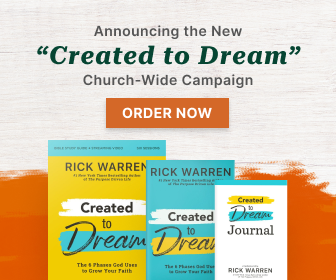Leadership
4 Steps to Becoming a Bridge-Building Preacher

If you drive onto the Saddleback Church campus from the back, you’ll have to pass over a bridge. It’s $6 million of concrete that is a nice symbol for our community.
It’s a statement to our community that nothing will keep us from reaching out to people. Saddleback wants to be a bridge to our neighbors.
All churches should be about building bridges. We build bridges between God and people. If you’re a preacher, it’s what God has called you to do. As preachers, we build bridges that connect the ancient text of the Bible with our contemporary audience.
Unfortunately, many pastors fall off one of the two edges of that bridge. Some like to focus their messages on the here and now. They are more cultural commentators than preachers. Their sermons don’t have enough Scripture in them to impact the lives of their congregation. They tend to slip into motivational speeches and pop psychology.
Other preachers fall off the other side. They’ll go on and on about biblical background and ancient world customs and leave little time for real-world applications. They are more like professors than preachers. And that’s not good enough either.
It’s easy to be biblical if you don’t care about being contemporary, and it’s easy to be contemporary if you don’t care about being biblical. To become a bridge-builder preacher and be able to apply the timeless truths of God to your congregation is one of the biggest challenges you’ll face as a biblical communicator.
So how do you become a bridge-builder preacher?
- Study the text.
Start by doing what you learned in seminary or Bible college—observe and interpret the text. Try to understand what the text is saying and what it means.
- Find the timeless truth.
Look in the passage for the universal truth that spans all cultures. Ask yourself how we should respond to this truth; that’s the implication of the text. Write it down.
- Think of your audience.
Put what you’ve learned about the timeless truth into your congregation’s context. Ask questions like this about the people you’re preaching to:
— What are their needs?
— What are their hurts?
— What are their sins?
— What are their interests?
— What are their questions?
If you don’t ask these questions about your text, you might be a nice Bible professor, but you’re not a preacher. Good communication always considers the listener.
No matter who you’re preaching to, you need to know these six universal truths that apply to any audience:
- Everyone wants to be loved.
- Everyone wants their life to count.
- No matter who they are, their lives are empty without Jesus.
- Many of the people you’re preaching to carry immense guilt.
- A past hurt has caused many people to be bitter.
- There is a universal fear of death in every culture.
Every single time you preach, you have people in your congregation facing these issues. Remind yourself of this every time you prepare a sermon.
- Apply the truth to their situation.
This is the secret of every master communicator. You need to translate the truth into action steps that are appropriate for your audience, considering their age, their maturity, and their culture.
Jesus did this: “With many stories like these, he presented his message to them, fitting the stories to their experience and maturity” (Mark 4:33 MSG).
If Jesus fit his message to his context, shouldn’t we do the same?
Learning to become a bridge-building preacher isn’t easy. It’s one of the most difficult and time-consuming skills you can learn in your ministry.
But if you want God to use your preaching to change lives, it’s critically important.















